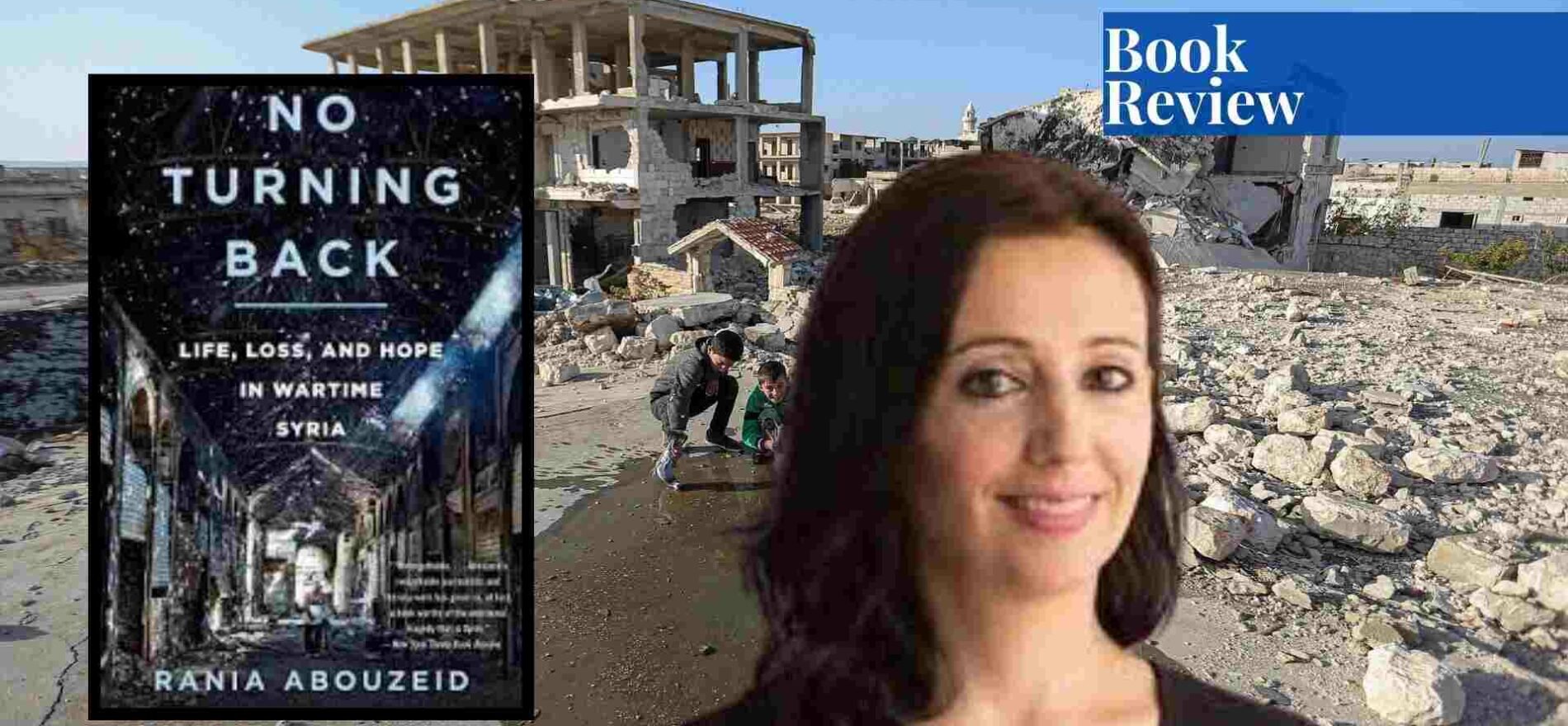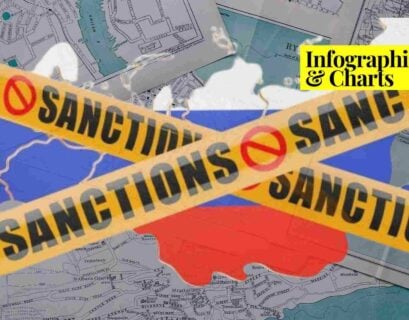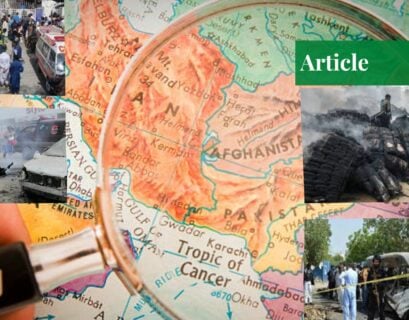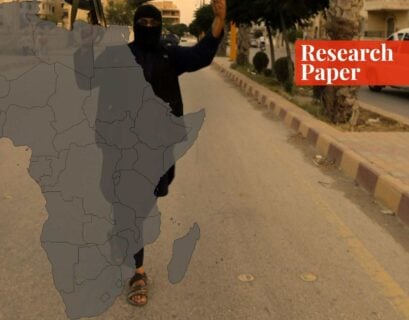Ayesha Firdous is pursuing her bachelor's in international relations from International Islamic University, Islamabad.
‘No Turning Back: Life, Loss, and Hope in Wartime Syria‘ is a poignant publication on the individual realities of Syria written by Rania Abouzeid in 2018.
About The Author
Abouzeid is from a Lebanese family that emigrated to Australia and presently lives in Beirut. She’s an independent print and television journalist who has almost two decades of experience in the Middle East and knows the history of the region, and how it impacts current events.
She has been honored with more than half a dozen journalism awards including the 2015 Michael Kelly Award, the 2014 George Polk Award for Foreign Reporting, and the 2013 Kurt Schork Award in International Journalism. This book is her first and it went on to win the OPC’s Cornelius Ryan Award for the best non-fiction book on international affairs and was also a finalist for five other awards, amongst numerous honors, including being selected as an NYT Notable Book of 2018 and a Financial Times’ Best Book of 2018.

Review
No Turning Back: Life, Loss, and Hope in Wartime Syria is a great amalgamation of personal and direct investigative reporting. It is not just another reporter’s “war journal,” but rather the story of a group of individuals who recounted to the author their experiences and how the war impacted their lives. It is the result of six years of firsthand reporting, involving numerous treks over the rocky terrain of Syria, Turkey, Jordan, and Lebanon.
Despite being blacklisted and banned by the Syrian regime in 2011, after being pinned with the accusation of spying, the author still managed to try and give the perspective of all parties involved in the war. When the Syrian conflict began in 2011, Rania Abouzeid went to Syria to report on it despite being banned from entering the country. Instead of focusing on the big picture as most press houses did, she chose to tell the stories of ordinary people caught up in the gruesome civil war in Syria. These individuals come from a variety of backgrounds and have differing beliefs which helped us understand the war and their struggle for survival.
Abouzeid’s No Turning Back: Life, Loss, and Hope in Wartime Syria is not about battles or strategy, it is about the human cost of war. It describes the Syrian civil war right from the uprising in 2011 till 2018. The author has tried to portray the conflict through the eyes of several parties involved including a common man named Suleiman Tlass Farzat, a fourth-year university student who went on to form and become commander of the Free Syrian Army Abu Azzam, Ruha a nine-year-old girl whose father helped finance the revolution from the town of Saraqeb which was heavily shelled by the regime, Mohammad who was the commander of Jabhat al-Nusra, the Syrian branch of Al-Qaeda and Saleh a radical Islamist from ISIS.
What started as a peaceful uprising against oppression in Syria was later hijacked by extremist groups and influenced by foreign powers who had their own twisted agendas. The book provides a unique outlook on the Syrian conflict, telling it from inside out rather than outside in. The book begins with the context of the Arab Spring in 2011. In Syria, protests initially started with small gatherings but faced opposition due to a long-standing ban on protests since the early 1960s.
The government, led by President Bashar al-Assad, justified its resistance. Early attempts at protests in Syria didn’t gain much momentum. The turning point or trigger came when a crowd in Hariqa protested against police mistreatment, initiating a state of emergency. This event resulted in a shift and later on protests erupted in different parts of Syria which demanded dignity, freedom, and bread.
The government responded with force, detaining protesters and using violence. However, the book goes on to explain how there were many different groups involved in the uprising, and they had different ideas about what kind of government Syria should have. Some wanted a Secular Democracy, while others wanted an Islamic Caliphate.
No Turning Back: Life, Loss, and Hope in Wartime Syria elaborates on how the uprising which spread rapidly, morphed into various groups without central leadership. The Free Syrian Army was an organized group campaigning for democracy, but when it took over an area, it couldn’t administer or control it properly which resulted in a lawless land. This oversight opened the door for Al-Qaeda-linked groups and ultimately ISIS. They brought in foreign fighters with no connection to Syria changing the course of Syrian uprisings which ended up caught between Assad’s army and ISIS. Locals were trying to topple the regime of Bashar al-Assad, but their war was later hijacked by Al-Qaeda and other powers like Russia, Saudia, and the US.
A challenging aspect of this war was that all parties involved later on had nothing to do with the liberation, but instead, they focused on their interests. Al-Qaeda and ISIS wanted Syrians to follow their definition of radical Islam, the US, Russia, and Saudi fought a proxy war so that they could later appoint their heads to drive forth their agenda and have a strong influence within the region.
The book very comprehensively shows how fighting to cast off the brutal Assad regime and the beginning with hope later transformed into the violence and disappointment that follow. The Syrian war was brutal, with Bashar al-Assad’s forces carrying out widespread destruction of homes, businesses, and entire towns. Thousands of innocent civilians were killed or imprisoned without due process. The Assad regime’s ruthlessness was evident in its use of torture and its disregard for the lives of its people. Besides the Assad regime, there was ISIS which was as brutal as Assad. The author gives us detailed and extremely disturbing views from people she interviews.
The most attractive and engaging part of this book was how the author helped her audience grasp a better understanding of the conflict in Syria in terms of individuals and their personal experiences rather than just organizations, armies, states, factions, religions, or groups. While the Assad regime, ISIS, and other factions may have had grand goals, the Syrian people were just trying to free themselves from a situation that went from bad to worse. The author sets out the timeline of events and provides a balanced overview of the different viewpoints on the revolution.
The book later tells the stories of different people in Syria during the conflict and details the dangers faced by people. The personal narratives also highlight the impact of the conflict on families and the dangers and difficulties faced by them. Overall, it offers a comprehensive and insightful perspective on the human experiences within the Syrian conflict which made it easy to form an emotional attachment to the plight of the Syrians.
The title of the book, ‘No Turning Back’ is representative of all the actors portrayed in the story showing the commitment and strength of the Syrians in their struggle for freedom and refusal to accept the harsh realities of what their lives had been reduced to in the war. The book also shines a light on the unfortunate realization that the outcome of the war is becoming increasingly unclear. According to the author, opposing interests, the passing of time, and an increasing lack of international concern can result in the distinct possibility that soon enough, there may not be a Syria to turn back to.
The author has used the word ‘hope’ in the title of the book but now it feels unlikely that the civil upspring will calm down anytime soon, as it has already changed into a proxy war for the global superpowers who don’t seem too eager to back away from their agendas anytime soon. This publication has the ability to make you empathize with the survivors of Syria, like little Ru ha. They have every right to live a normal life like other kids. Rania Abouzeid laid everything on the line to complete this project, Writing this book required repeated trips into a war zone, and even though she was banned and had arrest warrants out for her, she did not back down and succeeded in showing her audience a close capture of the conflict. She skilfully wrote about wartime destruction with a longing for hope. This book gives her readers a raw, honest, and clear-eyed look at the Syrian civil war.
If you want to submit your articles, research papers, and book reviews, please check the Submissions page.
The views and opinions expressed in this article/paper are the author’s own and do not necessarily reflect the editorial position of Paradigm Shift.



















